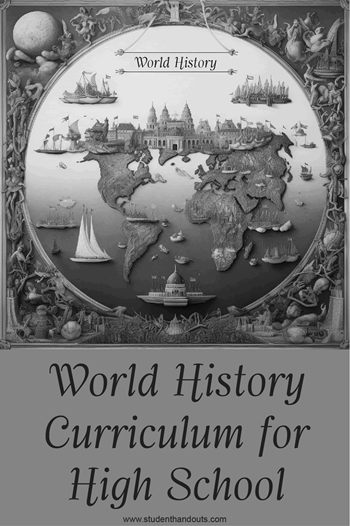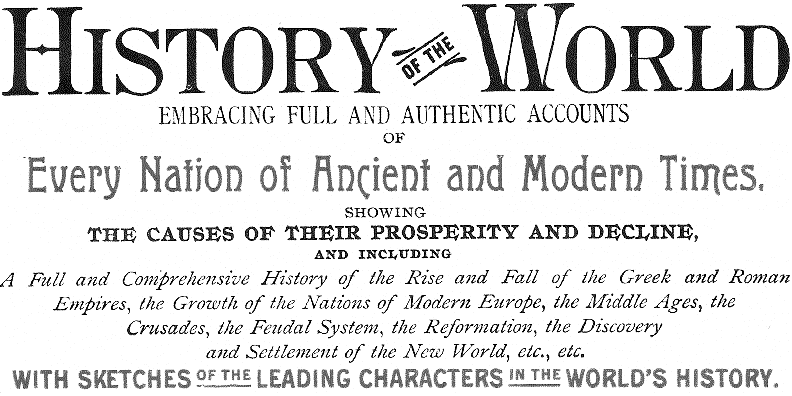World history is a vital field of study for high school students that examines the collective human experience across time and space. It encompasses the stories of civilizations, cultures, individuals, and events that have shaped our global society. The importance of world history can be understood from various perspectives, including its role in fostering a global perspective, promoting cultural understanding, informing decision-making, and offering valuable lessons for the future. Our free world history curriculum strives to bring junior and senior high school students face-to-face with the events, people, and places of our past.
 Fostering a Global Perspective: World history broadens our horizons by exposing us to diverse peoples, places, and time periods. It encourages us to view the world from a global perspective rather than a narrow, nationalistic one. This expanded view is crucial in our interconnected world, where events in one region can have far-reaching consequences globally. Understanding the interconnectedness of history helps us appreciate the complexities of contemporary global issues, such as climate change, international conflicts, and economic globalization.
Fostering a Global Perspective: World history broadens our horizons by exposing us to diverse peoples, places, and time periods. It encourages us to view the world from a global perspective rather than a narrow, nationalistic one. This expanded view is crucial in our interconnected world, where events in one region can have far-reaching consequences globally. Understanding the interconnectedness of history helps us appreciate the complexities of contemporary global issues, such as climate change, international conflicts, and economic globalization.
Promoting Cultural Understanding: World history facilitates cultural understanding and empathy by exploring the rich tapestry of human civilizations. It exposes us to the values, beliefs, traditions, and art forms of different cultures, fostering respect for cultural diversity. This understanding is essential for peaceful coexistence in a world characterized by cultural pluralism and globalization. It also helps combat stereotypes, prejudice, and ethnocentrism.
Informing Decision-Making: Knowledge of world history equips individuals and societies to make informed decisions. Understanding historical patterns and precedents can help policymakers, diplomats, and citizens navigate complex issues, make strategic choices, and avoid repeating past mistakes. History provides insights into the consequences of various policies, ideologies, and actions, enabling us to shape a better future.
Lessons for the Future: History serves as a repository of valuable lessons. By studying the successes and failures of past societies, we gain insights into the dynamics of governance, economics, social movements, and technological advancements. These insights can inform our efforts to address contemporary challenges, such as poverty, inequality, and political instability. History also teaches us about resilience, adaptability, and the capacity for positive change.
Preserving Cultural Heritage: World history plays a crucial role in preserving cultural heritage. It helps us recognize the significance of historical landmarks, artifacts, and sites. Understanding the historical context of cultural treasures allows us to appreciate their importance and protect them for future generations.
Inspiration and Identity: Learning about the accomplishments of individuals and societies in the past can inspire us to achieve great things in our own lives. Historical figures who have overcome adversity, advanced human knowledge, or championed social justice serve as role models. Moreover, history provides a sense of identity and belonging, connecting us to the narratives of our ancestors and the legacies they left behind.
Promoting Critical Thinking: Studying world history cultivates critical thinking skills. It encourages us to analyze sources, question assumptions, assess evidence, and construct well-reasoned arguments. These skills are invaluable in a world flooded with information, disinformation, and complex issues.
Cultivating Civic Engagement: An understanding of world history is essential for informed and engaged citizenship. It encourages active participation in democratic processes, civic debates, and social advocacy. An informed citizenry is better equipped to hold governments accountable and advocate for positive change.
World history is of paramount importance for its ability to broaden perspectives, promote cultural understanding, inform decision-making, offer valuable lessons, preserve cultural heritage, inspire individuals and societies, cultivate critical thinking, and foster civic engagement. It provides us with a profound sense of context, allowing us to better navigate the challenges and opportunities of our rapidly evolving world. By studying world history, we not only honor the past but also prepare ourselves for the complexities of the future. Our free world history curriculum makes these goals a reality.
|

 Fostering a Global Perspective: World history broadens our horizons by exposing us to diverse peoples, places, and time periods. It encourages us to view the world from a global perspective rather than a narrow, nationalistic one. This expanded view is crucial in our interconnected world, where events in one region can have far-reaching consequences globally. Understanding the interconnectedness of history helps us appreciate the complexities of contemporary global issues, such as climate change, international conflicts, and economic globalization.
Fostering a Global Perspective: World history broadens our horizons by exposing us to diverse peoples, places, and time periods. It encourages us to view the world from a global perspective rather than a narrow, nationalistic one. This expanded view is crucial in our interconnected world, where events in one region can have far-reaching consequences globally. Understanding the interconnectedness of history helps us appreciate the complexities of contemporary global issues, such as climate change, international conflicts, and economic globalization.













































